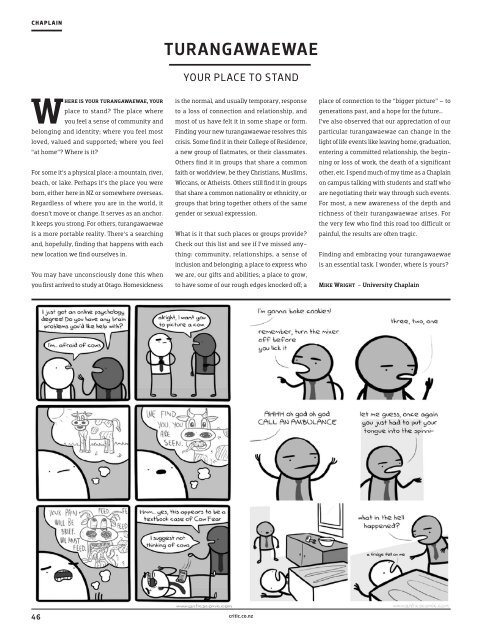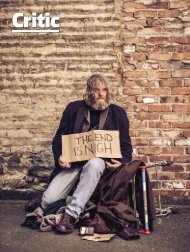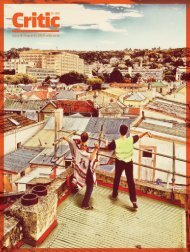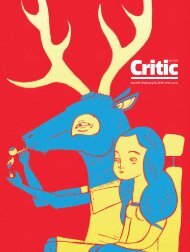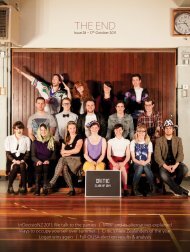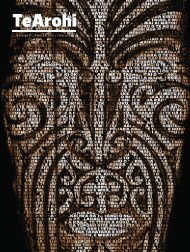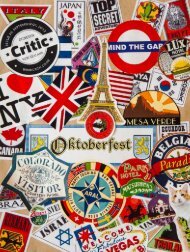Issue 20 | August 13,2012 | critic.co.nz
Issue 20 | August 13,2012 | critic.co.nz
Issue 20 | August 13,2012 | critic.co.nz
You also want an ePaper? Increase the reach of your titles
YUMPU automatically turns print PDFs into web optimized ePapers that Google loves.
chAPlAiN<br />
Where is your turangawaewae, your<br />
place to stand? The place where<br />
you feel a sense of <strong>co</strong>mmunity and<br />
belonging and identity; where you feel most<br />
loved, valued and supported; where you feel<br />
“at home”? Where is it?<br />
For some it’s a physical place: a mountain, river,<br />
beach, or lake. Perhaps it’s the place you were<br />
born, either here in NZ or somewhere overseas.<br />
Regardless of where you are in the world, it<br />
doesn’t move or change. It serves as an anchor.<br />
It keeps you strong. For others, turangawaewae<br />
is a more portable reality. There’s a searching<br />
and, hopefully, finding that happens with each<br />
new location we find ourselves in.<br />
You may have un<strong>co</strong>nsciously done this when<br />
you first arrived to study at Otago. Homesickness<br />
46<br />
TURANGAWAEWAE<br />
yOur PlaCe tO stanD<br />
is the normal, and usually temporary, response<br />
to a loss of <strong>co</strong>nnection and relationship, and<br />
most of us have felt it in some shape or form.<br />
Finding your new turangawaewae resolves this<br />
crisis. Some find it in their College of Residence,<br />
a new group of flatmates, or their classmates.<br />
Others find it in groups that share a <strong>co</strong>mmon<br />
faith or worldview, be they Christians, Muslims,<br />
Wiccans, or Atheists. Others still find it in groups<br />
that share a <strong>co</strong>mmon nationality or ethnicity, or<br />
groups that bring together others of the same<br />
gender or sexual expression.<br />
What is it that such places or groups provide?<br />
Check out this list and see if I’ve missed anything:<br />
<strong>co</strong>mmunity, relationships, a sense of<br />
inclusion and belonging; a place to express who<br />
we are, our gifts and abilities; a place to grow,<br />
to have some of our rough edges knocked off; a<br />
<strong>critic</strong>.<strong>co</strong>.<strong>nz</strong><br />
place of <strong>co</strong>nnection to the “bigger picture” – to<br />
generations past, and a hope for the future…<br />
I’ve also observed that our appreciation of our<br />
particular turangawaewae can change in the<br />
light of life events like leaving home, graduation,<br />
entering a <strong>co</strong>mmitted relationship, the beginning<br />
or loss of work, the death of a significant<br />
other, etc. I spend much of my time as a Chaplain<br />
on campus talking with students and staff who<br />
are negotiating their way through such events.<br />
For most, a new awareness of the depth and<br />
richness of their turangawaewae arises. For<br />
the very few who find this road too difficult or<br />
painful, the results are often tragic.<br />
Finding and embracing your turangawaewae<br />
is an essential task. I wonder, where is yours?<br />
Mike Wright - University Chaplain


